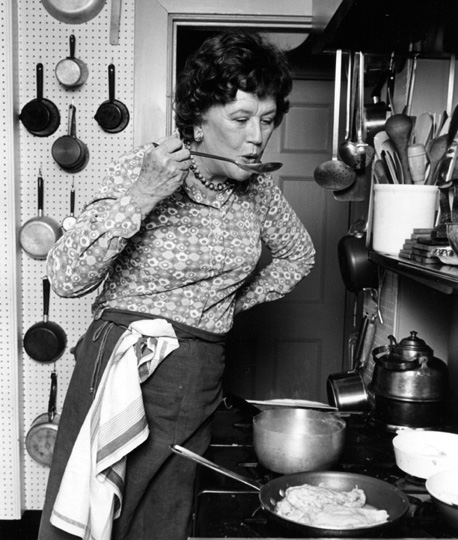Julia Child:
From the OSS to The French Chef
Special to the Newsletter
by Michael F. Bishop
Julia Child was a towering presence—literally and figuratively—on the American culinary and cultural scenes. Through her television shows, the 6’2” Child brought French cuisine into people’s living rooms, demystifying complex recipes with her infectious enthusiasm, distinctive voice, and unpretentious charm.

Julia Carolyn McWilliams was born on August 15, 1912, in Pasadena, California. Raised in an affluent family, Child’s early life showed little hint of her future culinary stardom. She attended Smith College, graduated in 1934 with a degree in history, and worked as a copywriter before joining the Office of Strategic Services (OSS) during World War II. Stationed in Ceylon (now Sri Lanka) and China, she met Paul Child, a sophisticated artist and diplomat who introduced her to fine dining. Their marriage in 1946 and subsequent move to Paris in 1948, where Paul was stationed with the U.S. Foreign Service, set the stage for her culinary awakening.
In Paris, Child’s love for food blossomed. Her first meal of sole meunière was a revelation; it fired a passion for French cuisine. At 37, she enrolled in Le Cordon Bleu, one of the few women in a male-dominated professional cooking course. Under chef Max Bugnard, she honed her skills, and mastered techniques like deboning a duck and making a perfect beurre blanc. Her training wasn’t just technical; it instilled a respect for precision and a belief that good cooking was accessible to anyone willing to learn.
Child’s defining contribution began with her collaboration on Mastering the Art of French Cooking. Along with French cooks Simone Beck and Louisette Bertholle, she spent nearly a decade researching, testing, and writing recipes. Published in 1961, the book was revolutionary. Child’s insistence on clarity and her conversational tone made the book a bestseller. A second volume followed in 1970, cohered her authority.
Her television career made her a star. The French Chef debuted in 1963 on WGBH, Boston’s public television station. The show was a phenomenon, running for a decade and earning Child a Peabody Award and an Emmy. Her unpolished style—dropping food, laughing off mistakes, and sipping wine on air—endeared her to audiences. She wasn’t a performer playing a role; she was a teacher who happened to be on TV. Her catchphrase, “Bon appétit!” became synonymous with her joyful approach. Later shows like Julia Child & Company and Dinner at Julia’s continued her mission to educate and entertain.
Child’s influence went beyond recipes. She challenged the 1950s American reliance on processed foods, advocated for fresh ingredients, and thoughtful preparation. She wasn’t dogmatic; she embraced convenience when it made sense—but insisted on quality and taste. Her work coincided with a growing interest in international cuisine, and she helped Americans see cooking as an adventure, not a chore. She also championed women in the culinary world, by co-founding the American Institute of Wine & Food, and supporting the James Beard Foundation. Her personality was as much a draw as her expertise; her warbling voice, boundless energy, and willingness to poke fun at herself made her immensely appealing. She wasn’t a chef in the traditional sense—she never ran a restaurant—but her knowledge and ability to communicate it were unmatched. She corresponded with fans, answered questions with patience, and remained approachable, despite her fame. Her marriage to Paul, who died in 1994, was a deeply loving partnership of mutual support; his photography and encouragement were integral to her success.
Child’s later years were marked by continued productivity. She wrote more books, including The Way to Cook (1989), and appeared on shows like Cooking with Master Chefs. She received France’s Legion of Honour in 2000 and the U.S. Presidential Medal of Freedom in 2003. Living in Montecito, California (near her favorite Mexican restaurant, La Super-Rica), she remained active until her health declined. She died on August 13, 2004, two days shy of her 92nd birthday, from kidney failure.
The Smithsonian’s National Museum of American History houses her Cambridge kitchen, a testament to her cultural impact. Her books remain in print, and her shows are still watched by aspiring cooks. Meryl Streep’s portrayal in the 2009 film Julie & Julia introduced her to a new generation. Child wasn’t just teaching recipes; she was cultivating confidence, curiosity, and the belief that mistakes in the kitchen were part of the fun. In a world of fast food and fleeting trends, Julia Child’s message—that cooking is an art worth mastering—is as important as ever.
Michael F. Bishop, a writer and historian, is the former executive director of the International Churchill Society and the Abraham Lincoln Bicentennial Commission.




